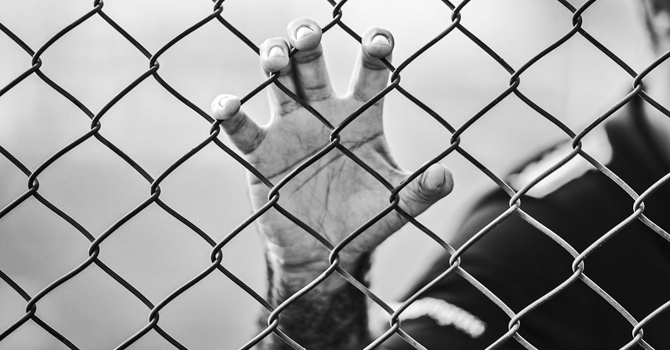Mental Health, Incarceration, and COVID-19

Chanese A. Forte
PhD Student, Environmental Health Sciences and Scientific Computing
Click Here for the Latest on COVID-19 from Michigan Public Health ExpertsOn March 13, 2020, the University of Michigan announced it would be closing its doors due to a novel virus. One day later, I received a call that my brother had been arrested in Georgia after being taken to the hospital for a schizophrenic episode.
As I made my way to Georgia, I thought back on the five days prior to the phone call and all of the hours my brother sat in waiting rooms of free clinics and even the emergency room trying to receive free mental health care. Clinicians were afraid to show up to work due to COVID-19. Waiting rooms were beginning to close and many centers were not taking new patients. One administrator even told my brother she wouldn’t admit him to their clinic because she “feared the psychiatrist was racist” and my brother may end up dead like other patients of hers.
Unfortunately, he has been able to get some of the care he needs only because he is an inmate.
Today, my brother finally has access to mental health care—with restrictions. But unfortunately, he has been able to get some of the care he needs only because he is an inmate. Additionally, the mental health care system within the US Department of Justice focuses on competency instead of quality of life or evidence based-best practices, like most mental health care systems in the civilian world do. Essentially this means that, as long as inmates can take care of themselves (that is, eating and maintaining good hygiene) and know what year it is and other basic information, they are considered “stable enough to stand for court.”
Almost 1.6 million people are currently being housed across the US in state and federal prisons, not including jails (Kann 2019,Legal Aid Society 2020). The US population represents only 4.4 percent of the world’s population, but the US prison population makes up 22 percent of the world’s prison population (Kann 2019). Additionally, according to the Bureau of Justice Statistics report released in 2016, two thirds of all inmates in local jails were not convicted of a crime (BJS 2016).
Currently in the US, ten times more people with mental health disorders are in jail or prison than in mental health facilities. That means roughly 356,000 inmates are not receiving the care they need according to evidence-based psychiatry (Sager 2020). According to Patrisse Cullors, activist and co-founder of Justice Los Angeles, prisons do not focus on a therapeutic treatment of prisoners, and often people living with mental health disorders are the ones first brutalized in prisons and jails (Sager 2020).
The coronavirus pandemic further complicates this matter. As recently as late March 2020, the Los Angeles Police Department was still arresting individuals for committing petty crimes (Sager 2020). This is unacceptable since most US prisons are not equipped to treat a high volume of patients for a novel disease, and social distancing in a small room shared with one other person and a toilet is nearly impossible.
Trying to locate my brother was difficult and has taken numerous phone calls, emails, and visits to the jail. Once I figured out where my brother was, I learned I wouldn’t be able to visit him due to COVID-19 (after making an appointment just the day before) and that the magistrate was not holding court for an indefinite amount of time due to a COVID-19-related superior court order written into law just two days before my brother’s arrest. It would be a while before Georgia would hold court virtually or have virtual visitation for inmates. At the time this article was written, no civil court cases or trials are being held during the global pandemic in numerous states across the country. This means the many people currently in a US jail—and not convicted—during this pandemic can get out of jail only through a plea deal or by paying thousands of dollars in bond (if granted bail).
The Bureau of Prisons (BOP) refers to each prison as “a small city” and considering the mass imprisonment and overcrowding in many US jails and prisons, this description is very apropo. The only caveat being these small cities that are the prison system are doing far worse based on infection rate of coronavirus. As of May 22, 2020, the infection rate within the New York Department of Corrections was 11.6 percent, while the infection rate in the state of New York—the epicenter of COVID-19 in the US—was 1.9 percent. For the rest of the US, the infection rate is 0.5 percent (Legal Aid Society 2020). According to the BOP, there are 1,556 federal inmates and 175 BOP staff who have been confirmed positive, and 59 federal inmates and 0 staff members have died due to COVID-19 (BOP 2020). However, when looking at the pandemic throughout the jail system, Rikers Island is being referred as the epicenter of the epicenter in the US (CNN 2020, Legal Aid 2020). At the beginning of the COVID-19 pandemic in New York, lawmakers pushed to release more than 2,600 people from Riker’s who were considered low risk for a future crime and high risk for COVID-19 . However, the famed Rikers Island jail system is not alone in rapid outbreaks. The BOP reported in April 2020 that of the 2,700 inmates tested, 2,000 of them tested positive for COVID19 (Balsamo 2020).
For my family the coronavirus pandemic has severely delayed being able to find my brother, connect him with a public defender, and ultimately get him out of jail due to housing insecurity being at a peak in the wake of COVID-19. In Georgia, 414 inmates have already tested positive for COVID-19, and I am reminded to be thankful every day his jail doesn’t show up on the Georgia list of jails with positive inmates. And each day my brother sits in jail is another day he doesn’t have access to all of his medications and another day that paranoid schizophrenia takes a stronger grip on his mental health. For now, I stay strong in the hope I will be able to hold my brother again before COVID-19 comes to his jail or he suffers from further mental decompensation.
What Can You Do to Help?
Call your mayor, sheriff, or state elected official on the behalf of all incarcerated people and leave a message urging them to take action. Contact information and a script are provided via The Bail Project based on your address.
Donate to an organization that supports mental health or prison reform. A few organizations to check out:
- National Alliance on Mental Illness (NAMI)
- Prison Creative Arts Proejct (PCAP)
- Michigan Center for Youth Justice
- Detroit Justice Center
- Prison Fellowship
- Michigan Liberation
- The Bail Project: Detroit Justice Center
Read the work of scholars and activists who work on this:
- Ruth Wilson Gilmore (Grad Center-CUNY) – Prison Abolitionist
- Angela Davis (UCLA Professor) – Prison/Industrial Complex
- Patrisse Cullors (Black Lives Matter)
Listen to the stories of inmates on Ear Hustle Podcast to learn about life inside San Quentin prison
Collaborate with University of Michigan researchers. Here are a few researchers doing work on this topic:
- Ihudiya “Finda” Ogbonnaya-Ogburu, PhD candidate at the School of Information
- Aya M. Waller-Bey, PhD student in Sociology, OpEd on mental health in graduate school after incarceration of a sibling.
- monét cooper, PhD student in English
- University of Michigan LSA Prison Creative Arts Project
References
- Sager, Rebekah (7 April 2020). The Coronavirus Pandemic Shows America’s Prison System is
"Inhumane." Huffpost.com. - Kann, Drew (21 April 2019). 5 Facts behind America’s High Incarceration Rate. CNN.
- Bureau of Justice Statistics (April 2020). Prisoners in 2018. US Department of Justice: NCJ253516.
- Bureau of Justice Statistics (February 2018). Jail Inmates in 2016. US Department of Justice: NCJ251210.
- The Past Predicts the Future: Criminal History and Recidivism of Federal Offenders (March 2017). US Sentencing Commission.
- Federal Bureau of Prisons (2020). COVID19 Update.
- Legal Aid NYC (2020). COVID-19 Infection Tracking in NYC Jails.
- Moghe, S (18 May 2020). Inside New York's Notorious Rikers Island Jails, 'the Epicenter of the Epicenter' of the Coronavirus Pandemic. CNN.
- Balsamo, M (19 April 2020). Over 70% of Tested Inmates in Federal Prisons Have COVID19. Associated Press.
About the Author
 Forte is a PhD candidate pursuing a dual degree in Environmental Health Sciences and
Scientific Computing. She received her bachelor’s degree from Bard College and her
master’s in public health from the University of Georgia. Forte’s research focuses
on breast cancer development and pesticide exposure. She is a 2020 Edward A. Bouchet
Honor Society Inductee and recipient of a 2020 Outstanding Undergraduate Research
Opportunity Program Mentor Award.
Forte is a PhD candidate pursuing a dual degree in Environmental Health Sciences and
Scientific Computing. She received her bachelor’s degree from Bard College and her
master’s in public health from the University of Georgia. Forte’s research focuses
on breast cancer development and pesticide exposure. She is a 2020 Edward A. Bouchet
Honor Society Inductee and recipient of a 2020 Outstanding Undergraduate Research
Opportunity Program Mentor Award.
